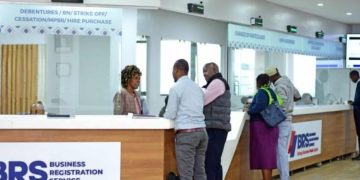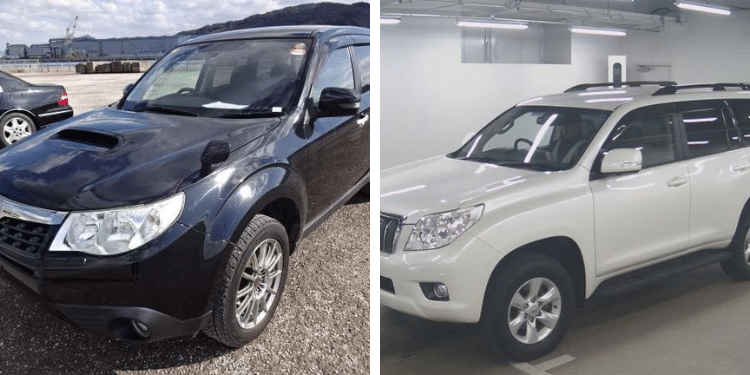In today’s global marketplace, every individual is excited about the opportunity of owning a high-quality vehicle. In the global marketplace importing a vehicle may be a daunting process. With the complexities of car importation, many people are looking for ways to manoeuvre them so that they easily import vehicles from Japan and other countries.
However, the process can be lightened up through an online platform. A post on social media on October 25, explained a step-by-step process on how to navigate through an online platform to acquire high-quality used cars from SBT Japan.
For instance, if you anticipate importing a vehicle online through SBT Japan, you can opt to follow the following steps:
- Visit SBT Japan. Ensure it’s the correct website.
- Find the car you want. Usually, you can get lower mileage at a better price than those high mileage being sold by “dealers.”
- Identify a clearing agent.
- Get an invoice for FOB.
- Pay the invoice.
- Give them clearing agent details.
- They will send you a bill of lading with all the car’s shipment details.
- Give the original bill of lading to the clearing agent.
- Wait for the car. It takes 30-45 days, depending on the route used by the vessel.
- The clearing agent advises when the car arrives. You can even track the vessel online. Pay applicable taxes and clearing fees.
- Pay registration fees.
- Take the bus or SGR to Mombasa.
- Get your car from the customs/clearing agent.
- Visit a petrol station and do a service.
- Drive your car to wherever.

SBT Japan
SBT Japan is a global company that is known for exporting vehicles. The company has been in operation since 1993. In addition, it offers a wide range of vehicles from various brands such as Nissan, Toyota, and Honda among other brands.
Moreover, their main office is in Yokohama. Moreover, they provide detailed information on each vehicle in their inventory including prices and shipping options.
Also Read: Govt to Stop Importation of Select Used Vehicles
Kenya’s Motor Vehicle Importation Procedure
The Kenya Revenue Authority (KRA) has provided regulations for importing a car or any vehicle into the country. Those who desire to own one therefore are called to abide by the guidelines for a successful process.
Moreover, The vehicle must comply with the Kenya Bureau of Standards requirements of Legal Notice No. 78 of 15th July 2005 (Verification of Conformity to Kenya Standards Imports Order, 2005) and KS1515:2000 Kenya Standard Code of Practice for Inspection of Road Vehicles. In particular, the Imported vehicle;
- Must be less than 8 years old from the year of first registration.
- Will be subject to roadworthiness inspection by a KEBS-appointed inspection agent in the country of export.
- Must be a Right-Hand drive
Furthermore, a new motor vehicle valuation template is available for your use during the importation process.
Taxes Applicable in Motor Vehicle Importation
The following taxes/duties are payable for motor vehicle imports based on customs value.
- Import Duty (25%)
This applies to all other vehicles except ambulances and hearses (0%)
- Excise Duty
Motor cars and other motor vehicles that are purposely designed for the transport of people.
- Other vehicles, with spark-ignition internal combustion reciprocating piston engines, of a cylinder capacity exceeding 1,000 cc but not exceeding 1,500 cc, assembled. (20%)
- Other vehicles, with spark-ignition internal combustion reciprocating piston engines, of a cylinder capacity exceeding 1,500 cc but not exceeding 3,000 cc, assembled. (25%)
- Other vehicles, with spark-ignition internal combustion reciprocating piston engines, of a cylinder capacity exceeding 3,000 cc, assembled. (35%)
- Other vehicles, with compression-ignition internal combustion piston engines (diesel or semi-diesel), of a cylinder capacity not exceeding 1,500 cc, assembled. (25%)
- Other vehicles, with compression-ignition internal combustion piston engines (diesel or semi-diesel), of a cylinder capacity exceeding 1,500 cc but not exceeding 2,500 cc, assembled (25%)
- Other vehicles, with compression-ignition internal combustion piston engines (diesel or semi-diesel), of a cylinder capacity exceeding 2,500 cc, assembled. (35%)
- Other vehicles, with both spark-ignition internal combustion reciprocating piston engines and electric motors as motors for propulsion, other than those capable of being charged by plugging into an external source of electric power (25%)
More Taxes
- Other vehicles, with both compression-ignition internal combustion piston engines (diesel or semi-diesel) and electric motors as motors for propulsion, other than those capable of being charged by plugging into an external source of electric power (25%)
- Other vehicles, with both spark-ignition internal combustion reciprocating piston engines and electric motors as motors for propulsion, capable of being charged by plugging into an external source of electric power (25%)
- Other vehicles, with both compression-ignition internal combustion piston engines (diesel or semi-diesel) and electric motors as motors for propulsion, capable of being charged by plugging into an external source of electric power (25%)
- Other vehicles, with only electric motors for propulsion (10%)
- Value Added Tax (16%)
- Import Declaration Fees (3.5%)
- Railway Development Levy (2%)
Also Read: 4 Steps You Should Not Miss When Buying Second-Hand Car
Documents required
Apart from the taxes, other Importation Supporting documents should be attached. They include the following but are not limited to:
- Original Commercial Invoice
- Original Logbook from the country of importation that has been cancelled from the country of origin, as this will be required by the National Transport and Safety Authority to give you an original Kenyan Logbook
- Original Bill of Lading
- Pre-shipment inspection certificate. (certificate of roadworthiness)
- Copy of your PIN certificate/ Copy of certificate of Incorporation (applicable to companies)
Follow our WhatsApp Channel and join our WhatsApp Group for real-time news updates.















































































